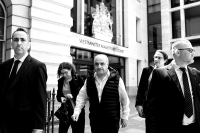The divide between the rich and the poor is obvious in Britain today. Whether in terms of income, geography or political outlook, the cleavage between the haves and have-nots widens conspicuously. It has become a source of much snobbery and resentment. But there is another field in which this division can be witnessed, yet all too often goes ignored: free speech. Increasingly, the freedom to express your political opinions has become the privilege of the rich, while the poor – or even those on middle incomes – now fear to say what they like. This is especially the case when it comes to talking about gender, race and Brexit.
So fearful of speaking their minds on these touchy subjects, and scared of questioning liberal orthodoxies, many folk are now ‘self-cancelling’. This is the view of Tom Stoppard, who on Newsnight the other day spoke of this sinister etiquette that many conservatives – consciously or not – already know: that you don’t voice any anti-EU, anti-woke opinions in polite society, among most of your friends from school and university, even among relatives, and certainly not in the workplace. You will lose face, or possibly even your livelihood. ‘People tread warily, they’re careful of what they say,’ said the playwright. ‘I’m way behind the curve as to what is sayable and what is thinkable’.
Roger Daltrey, lead singer of The Who, and Bruce Dickinson, lead singer of Iron Maiden, have been comfortable in airing their pro-Brexit views over the years
But Stoppard is rich and old. He can say what he likes. He doesn’t need to work again. The same goes for J.K. Rowling, who can literally afford to say unfashionable things about the transgender movement. So can Germaine Greer. And, I suspect, so can transgender-sceptics like Julie Burchill, Janice Turner and Suzanne Moore, who do so from a position of relative security (voicing truths and controversial opinions is their living, after all). But even Moore paid the price by being denounced by her colleagues on the Guardian, causing the two to part company.
Roger Daltrey, lead singer of The Who, and Bruce Dickinson, lead singer of Iron Maiden, have been comfortable in airing their pro-Brexit views over the years. Because, likewise, they can: they’re rich, and old. The same luxury has not been afforded to the vocal pro-Brexit trade unionist Paul Embery, who lost a job recently on account of his politiciking.
Moore’s and Embery’s fate lurks in the recesses of our minds before we confess that we voted for Brexit, or hate the egregious and insincere ‘taking of the knee’, or that we think the transgender movement is bizarre and harmful. This is what Helen Joyce talks about in her recent book, Trans. She writes of the consequences of a bullying and fanatical cult, to which you either adhere or pay lip-service, or become a social outcast. As the veteran feminist and outspoken transgender-sceptic Jo Bartosch has written:
‘Citizens who ask questions are socially shunned, becoming legitimate targets for violence and hatred.’
The trans movement is the most obvious example of something that causes ‘self-cancellation’. But wokery is a broad church, and you dare question the religion at your peril. Even at the top level, those who are not famous and those not spectacularly loaded dare not speak their minds. As Rod Liddle writes in this week’s Spectator, in reference to those who have dubious left-wing views and who yet get along in life unhindered:
‘But think that Israel has a right to exist or that Hillary Clinton would have made a rotten president or that the UK was right to leave the European Union, and you will find it much harder to gain an academic position and still less to work for the UN or WHO’.
Some people do genuinely believe the myths of the transgender movement, for example, or the importance of ‘taking the knee’. But there are plenty of others who just pay lip-service or don’t want to cause trouble for themselves. As the journalist Olivia Hartley put it recently, they are ‘happy to take a knee not because of a commitment to equality but from simple social subservience…an aggressive form of passivity, motivated surprisingly often out of fear.’
‘The only respite can be found on small corners of the internet’, concludes Bartosch. Indeed. Most of the cowered public with unfashionable views only make them known anonymously on Twitter under assumed personas. Luckily, we conservative journalists are the exception. We can be as non-politically correct and anti-EU as we like, because we get paid for it. Consequently, we also receive many private messages from people saying ‘thank God someone said this in public’ or ‘I wouldn’t say this using my real name because I know my boss might be watching.’
We are not talking here of racists, sexists or anti-vaccine conspiracy theorists. We are talking of intelligent people like Rowling or Richard Dawkins, people who utter truths because they can. What a shame that it’s become the privilege of the affluent (and we journalists) to do so. Because it’s important. As Stoppard himself put it: ‘I believe in truth and falsehood; I don’t understand how society can operate without that any more than science can.’






Comments